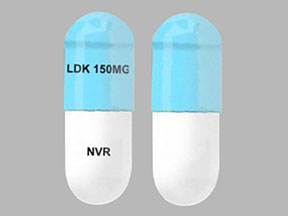Ceritinib and Alcohol/Food Interactions
There are 2 alcohol/food/lifestyle interactions with ceritinib.
Nicotine Ceritinib
Moderate Drug Interaction
Ceritinib may increase the blood levels and effects of nicotine. You may need a dose adjustment or more frequent monitoring by your doctor to safely use both medications. Contact your doctor if your condition changes or you experience increased side effects. It is important to tell your doctor about all other medications you use, including vitamins and herbs. Do not stop using any medications without first talking to your doctor.
Ceritinib Food/Lifestyle
Major Food Interaction
Do not consume grapefruit or grapefruit juice during treatment with ceritinib unless directed otherwise by your doctor. Grapefruit juice can increase the blood levels of ceritinib to dangerous levels, increasing the risk of an irregular heart rhythm that may be serious. Other, more common side effects such as diarrhea, nausea, vomiting, abdominal pain, and hyperglycemia (high blood sugar) may also increase. You should seek immediate medical attention if you develop sudden dizziness, lightheadedness, fainting, shortness of breath, or heart palpitations during treatment with ceritinib. Food may also increase the blood levels of ceritinib. Therefore, you should take ceritinib on an empty stomach, meaning no food should be eaten for at least two hours before or after taking ceritinib. It is important to tell your doctor about all other medications you use, including vitamins and herbs. Do not stop using any medications without first talking to your doctor.
Switch to professional interaction data
Ceritinib drug interactions
There are 737 drug interactions with ceritinib.
Ceritinib disease interactions
There are 8 disease interactions with ceritinib which include:
- QT prolongation
- bradycardia
- GI complications
- hepatic impairment
- hyperglycemia
- pancreatitis
- renal impairment
- lung toxicity
More about ceritinib
- ceritinib consumer information
- Check interactions
- Compare alternatives
- Reviews (1)
- Side effects
- Dosage information
- During pregnancy
- Drug class: multikinase inhibitors
- Breastfeeding
- En español
Related treatment guides
Drug Interaction Classification
| Highly clinically significant. Avoid combinations; the risk of the interaction outweighs the benefit. | |
| Moderately clinically significant. Usually avoid combinations; use it only under special circumstances. | |
| Minimally clinically significant. Minimize risk; assess risk and consider an alternative drug, take steps to circumvent the interaction risk and/or institute a monitoring plan. | |
| No interaction information available. |
See also:
Further information
Always consult your healthcare provider to ensure the information displayed on this page applies to your personal circumstances.


